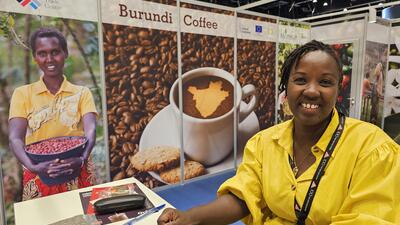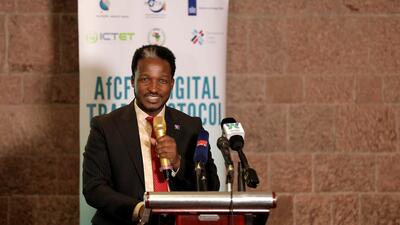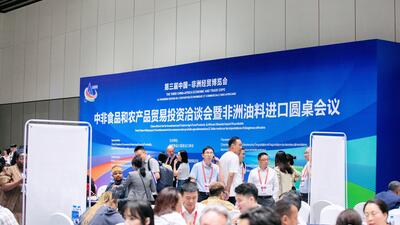ITC ED addresses African trade ministers, urges action to boost SMEs’ competitiveness
(ADDIS ABABA) Ms. Arancha González, the Executive Director of the International Trade Centre (ITC), outlined the agency’s planned US$ 60 million African trade integration programme at the annual conference of African Union (AU) trade ministers today. She also called for the ministers’ support for a Trade Facilitation Agreement under the auspices of the World Trade Organization, as a means to ease and speed up the integration of small and medium-sized entreprises (SMEs) into regional and global value chains.
Her address at the 8th Ordinary Session of the Conference of AU Ministers of Trade marks the first time an ITC Executive Director speaks at the annual meeting of African trade ministers. It was also Ms. González’s first visit to an ITC beneficiary country since assuming her role at the helm of ITC on 1 September.
ITC is committed to assist Africa’s exporters, particularly its SMEs, in reaping the benefits of export-led economic growth, she said. The agency is determined ‘to make trade work for growth, jobs, development and ultimately for poverty reduction in Africa,’ she told the ministers. More than half of ITC’s technical assistance at the country and regional level was destined to Africa last year, a ratio the agency seeks to maintain as it scales up its operations in coming years, she said. A key challenge for Africa is creating employment, and SMEs – the most labour intensive sector in the economy – are the largest potential source of growth and employment in the continent, she said.
To better position their SMEs for exports, Ms. González urged ministers to support an agreement on trade facilitation at the Ninth Ministerial Conference of the WTO in Indonesia in early December. ‘Effective trade facilitation procedures are critical for exporting SMEs, allowing them to connect to and operate value chains,’ she said. In order for the agreement to be effective for the exporters of even the poorest countries, its provisions need to be operational as soon as possible. ‘ITC stands ready to provide the necessary capacity building as a confidence builder,’ she told ministers.
As testimony to ITC’s commitment to Africa, she pointed to a US$ 60 million programme ITC is currently developing in line with the African Union’s Action Plan on Boosting intra-Africa Trade. This aims to sustain, deepen and expand the success of ITC’s earlier flagship Programme for Building African Capacity for Trade (PACT II). The new pan-African progrmme will contribute to increased exports by exploiting opportunities in regional trade and tapping into growing demand across sub-Saharan Africa by:
- promoting regional business advocacy on trade policy and regulatory reform,
- supporting the AU’s trade monitoring activities through the creation of a trade observatory,
- strengthening the African Business Council,
- strengthening the capacities of the five Regional Economic Commissions (RECs) to better assist regional trade,
- creating pools of African experts who can support SME exports,
- enhancing the export competitiveness of SMEs in selected sectors and
- supporting businesswomen and their networks.
‘I see this follow-up programme as a new era in ITC collaboration with Africa, responding to your regional integration needs through the Action Plan but also to individual country and SME needs,’ Ms. González said. She added that ITC would also continue to offer support to African countries in the areas of WTO accession, value chain integration in selected sectors including services, women and trade, youth and the environment.
Under PACT II, a US $20 million programme funded by the Canadian International Development Agency (CIDA), ITC developed an innovative approach to synchronize interventions at the level of policymaking, trade support services and capacity building of exporting enterprises to stimulate the private sector’s lead in regional integration in sub-Saharan Africa.
The programme strengthened the capacity of three REC secretariats and other trade support institutions to offer export support services to SMEs and trained a pool of African experts in areas such as trade information and law, market analysis, sector strategy, business generation and advocacy. It also assisted more than 2,700 women entrepreneurs in 20 countries, increasing their export competiveness through training programmes and facilitating their access to markets.
In North Africa, ITC’s US $8 million Enhancing Arab Capacity for Trade (EnACT) programme, also funded by CIDA, increased the export capacities of SMEs in Tunisia, Algeria, Egypt, Morocco and Jordan through developing export strategies, training more than 400 SMEs in area such as export design, quality and packaging, and connecting them with international markets. Successor programmes to EnAct, which ended this year, in AU member states in North Africa are currently under development.
For further information see the following:
- Statement of Ms. Arancha González at the 8th Ordinary Session of the Conference of AU Ministers of Trade
- Programme for Building African Capacity for Trade (PACT II)
- Enhancing Arab Capacity for Trade (EnACT)















